vatican

A new report mapping the Catholic Church’s more than 1.2 billion souls — on track to reach 1.64 billion by 2050 — holds some surprises.
And not all bode well for the church’s future as it faces major demographic and social shifts.
“Global Catholicism: Trends & Forecasts,” released June 1 by the Center for Applied Research in the Apostolate at Georgetown University, looks at seven regions of the world. It wraps the United States, Mexico, and Canada in with Central and South America as simply the Americas.
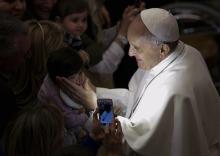
Pope Francis wants to treat the children of Italian prisoners to a train ride within the Vatican walls, a gesture intended to draw Catholics’ attention to Jesus’ command to minister to prisoners and the poor.
On May 30, Vatican guards will open a great iron gate to the “Children’s Train,” which will travel along the city-state’s only branch line for an appointment with the pope.
The chosen passengers are the prisoners’ children from Rome, Latina, Bari, and Trani.
They will have a midday meeting with Francis and will be given colored kites.
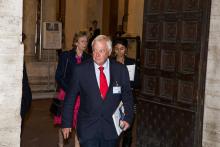
The Vatican is dragging its media machine into the 21st century, promising to promote social media and streamline its fragmented services with the help of a former BBC executive.
Lord Christopher Patten, former chairman of the BBC Trust, on May 27 outlined reform plans nearly a year after being appointed chief of the pope’s media committee.
Addressing journalists at St. Patrick’s church in central London, Patten highlighted “wasteful” duplications of media services at the Vatican and said modernization was imperative.

More than 55,000 people have signed a petition calling for Cardinal George Pell to return to his native Australia and face a government commission on child sex abuse, after allegations that he tried to bribe the victim of a pedophile priest.
Addressed to Pope Francis, the Change.org petition calls for Pell — the Vatican’s financial chief and former archbishop of Sydney — to answer questions from Australia’s Royal Commission into Institutional Responses to Child Sexual Abuse.
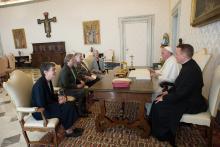
The controversial Vatican probe of American nuns that abruptly ended last month looked from the outside like a tense standoff between Rome and the U.S. sisters, punctuated by occasional public jousts that appeared to signal even tougher negotiations behind closed doors.
Not so, say the sisters, now freed to talk after both sides agreed to a month-long media blackout that ended May 15.
Those involved in the talks said that after a rocky start, the talks settled into a constructive dialogue that cleared up many misunderstandings that Vatican officials had about the sisters.
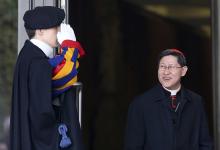
Caritas Internationalis, the global Catholic charitable organization, has elected Cardinal Luis Antonio Tagle as its new president, just months after the up-and-coming prelate welcomed Pope Francis to the Philippines.
Tagle, sometimes dubbed “the Asian Francis,” was elected on May 14 by delegates attending Caritas’ general assembly in Rome. He is the first Asian president of the organization and takes over from Honduran Cardinal Oscar Rodriguez Maradiaga, another Francis confidant, who served two terms as Caritas chief.
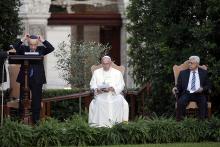
The Vatican’s decision to recognize Palestine as a sovereign state on May 13 angered Israeli officials.
The move comes four days before the first-ever canonization of two Palestinian nuns and it solidifies the standing of Palestinian President Mahmoud Abbas, who is scheduled to meet with Pope Francis at the Vatican on Saturday.
Israeli Foreign Ministry spokesman Emmanuel Nahshon told The Times of Israel that the government is “disappointed by the decision. We believe that such a decision is not conducive to bringing the Palestinians back to the negotiating table.”
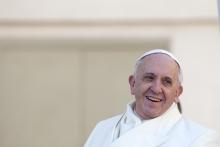
The Vatican announced it will recognize the state of Palestine in a treaty concluded May 13.
The treaty is awaiting formal approval and signing, but it is already being recognized as a major statement of support for a Palestian state in the historically contested region.
The pope has long signaled his support of a state. The language of the treaty, while not yet signed, has alarmed Israelis but invigorated the Palestinian case for statehood, The New York Times reports.
For the past year, the Vatican had informally referred to the country as “state of Palestine,” in its yearbook as well as in its program for Francis’ 2014 visit to the Holy Land.
Formal recognition of a Palestinian state by the Vatican, which has deep religious interests in the Israeli-occupied Palestinian territories that include Christian holy sites, lends a powerful signal of legitimacy to the efforts by the Palestinian Authority’s president, Mahmoud Abbas, to achieve statehood despite the long paralyzed Israeli-Palestinian peace process.
Read more from The New York Times here.
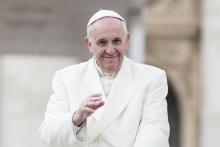
The Rev. Martin Schlag is a trained economist as well as a Catholic moral theologian, and when he first read some of Pope Francis’ powerful critiques of the current free market system he had the same thought a lot of Americans did: “Just horrible.”
But at a meeting on May 11 at the Harvard Club, Schlag, an Austrian-born priest who teaches economics at an Opus Dei-run university in Rome, reassured a group of Catholics, many from the world of business and finance, that Francis’ views on capitalism aren’t actually as bad as he feared.
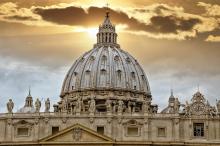
The Vatican’s semiofficial newspaper blasted a series of cartoons of Islam’s Prophet Muhammad as “blasphemous” but also condemned the “mad and bloodthirsty” extremists who opened fire at a Texas exhibit of the cartoons.
The front page article in L’Osservatore Romano likened the exhibit in Garland, Texas, to pouring “gasoline on the fire” of religious sensitivities and was critical of its sponsors, the American Freedom Defense Initiative, and professional provocateur Pamela Geller.
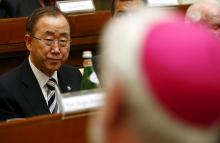
Top officials from the Vatican, the head of the United Nations, and leading scientists came together at a summit April 28 in Vatican City to label the fight against man-made climate change as a “moral issue.”
“Mitigating climate change and adapting to its effects are necessary to eradicate extreme poverty, reduce inequality, and secure equitable, sustainable economic development,” said Ban Ki Moon, U.N. secretary-general, in the keynote speech.
“It is a moral issue. It is an issue of social justice, human rights, and fundamental ethics,” the secretary-general said, adding that “climate change is the defining issue of our time.”
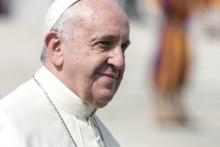
Pope Francis has been hailed for his forward thinking, but — at least according to French news reports — the pontiff has put on the brakes when it comes to a gay French ambassador at the Vatican.
In January, French President Francois Hollande nominated his protocol chief Laurent Stefanini as Vatican envoy to replace outgoing ambassador Bruno Joubert. The pick seemed ideal: 55-year-old Stefanini is described as brilliant and a devout Roman Catholic, who secured support for his candidacy from Cardinal Andre Vingt-Trois, the archbishop of Paris. He is also a known quantity at the Vatican, having served as first councillor to the Holy See a decade ago.
But so far, his nomination has gone nowhere. On April 22, France’s investigative weekly “Le Canard Enchaine” reported Pope Francis met with Stefanini last weekend. The message: The pontiff did not appreciate France’s 2013 same-sex marriage law, nor being pressured into accepting Stefanini’s candidacy.
French media report the standoff is due to Stefanini’s sexual orientation; France’s foreign ministry has only said his private life should be respected.
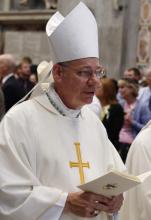
When Pope Francis accepted the resignation of Missouri Bishop Robert Finn, who was convicted three years ago for failing to report a priest suspected of child abuse, he sent a powerful message to the Catholic Church.
Here are five takeaways from the news, which the Vatican announced on April 21.
1. This is a big deal.
During the past decade, the most intense years of the Catholic Church’s long-running clergy sex abuse scandal, thousands of priests have been punished or defrocked for abusing children, and a few bishops found guilty of molestation have also quit.
But until Finn, no American bishop had ever been forced from office (despite the terse Vatican announcement that he “resigned”) for covering up for a predator priest.
That sets a precedent in an institution where many have regarded the hierarchy as a privileged caste that should not be held to the same standards as others in the church. Some feared that if a bishop were pushed out for failing to do his job, it would create a domino effect that could topple the entire superstructure.
“We all know there are other U.S. bishops wondering ‘who is the next?’” tweeted church historian Massimo Faggioli.
But Francis seems to be betting this sort of accountability at the top will strengthen the church, and even help restore the credibility of the bishops.
2. Finn was an easy case.
Finn is the only U.S. bishop ever convicted in court of failing to report a suspected abuser, the Rev. Shawn Ratigan, who was later sentenced to 50 years on federal child pornography charges.

The long and often contentious duel between the Vatican and the Leadership Conference of Women Religious came to an abrupt end on April 16. The probe of the umbrella group that represents most of the nation’s 50,000 nuns concluded with an amicable resolution that avoided serious sanctions for the sisters.
Here’s how the dispute played out:
April 2008: The Vatican’s Congregation for the Doctrine of the Faith taps Bishop Leonard Blair, then head of the Diocese of Toledo in Ohio, to carry out a doctrinal assessment of the LCWR.
December 2008: The Vatican’s office that oversees religious orders — the Congregation for Institutes of Consecrated Life and Societies of Apostolic Life — launches a parallel review of all women’s orders in the U.S. because of reports about “a certain secularist mentality that has spread among these religious families, perhaps even a certain ‘feminist spirit.’”
July 2010: Blair submits his eight-page initial assessment of the LCWR to the Vatican.
April 2012: The CDF announces a surprise crackdown on the LCWR, accusing the group of allowing views that have “serious theological, even doctrinal errors,” and conferences that featured “a prevalence of certain radical feminist themes incompatible with the Catholic faith.”
April 2012: The Vatican appoints Seattle Archbishop J. Peter Sartain, along with Blair and Bishop Thomas J. Paprocki of Springfield, Ill., to directly oversee an overhaul of the LCWR that would give the hierarchy the final say on the sisters’ statutes, speakers and published materials.
June 2012: After consulting the membership, the LCWR leadership responds by saying that the Vatican crackdown was based on “unsubstantiated” allegations and caused “scandal and pain” in the church. A week later, LCWR leaders meet with top Vatican doctrinal officials in Rome in what is called an atmosphere of “openness and cordiality.”
Three Years After 'Radical Feminist' Charge, U.S. Catholic Sisters and Vatican Reach Peace Agreement
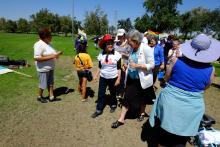
The conflicted and controversial three-year doctrinal investigation by the Vatican of U.S. Catholic sisters in the Leadership Conference of Women Religious has formally come to an end, according to a press release from the Vatican this morning and reports in the National Catholic Reporter.
“We are pleased at the completion of the Mandate which involved long and challenging exchanges of our understandings of and perspectives on critical matters of Religious Life and its practice," said Sr. Sharon Holland, IHM, president of LCWR.
She continued:
"Through these exchanges, conducted always in a spirit of prayer and mutual respect, we were brought to deeper understandings of one another’s experiences, roles, responsibilities, and hopes for the Church and the people it serves. We learned that what we hold in common is much greater than any of our differences.”
Conservative operators within the Vatican have been working for years to bring suspicion on communities of Catholic sisters in the U.S. In the past seven years, they succeeded in launching twin investigations into American nuns.
The first, launched in 2008, was a controversial and unprecedented "apostolic visitation" investigating the finances and communal practices of individual U.S.-based Catholic orders of women religious, representing tens of thousands of women. It ended in December 2014 with a formal backing down by the Vatican office from which it was launched. The final report, issued under Pope Francis, was released at a public press conference in Rome — also unprecedented — in which all those involved made clear statements about the process and emphasized a spirit of forbearance, mercy, and transparency.
The second, launched in April 2012, amounted to a hostile takeover of the Leadership Conference of Women Religious, which represents 80 percent of U.S. Catholic sisters and is the primary leadership governing body for U.S. Catholic women's orders. LCWR was accused by ultra-traditionalist Archbishop Levada of including "radical feminist themes" and fomenting "corporate dissent" from the church's teaching on human sexuality, among other things. Even though LCWR was founded in 1956 under the urging of Pope Pius XII, it was under Pope Benedict XVI that the doctrinal assessment took place.
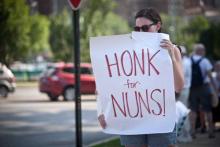
The Vatican on April 16 officially ended a controversial investigation of American nuns with a face-saving compromise that allows Pope Francis to close the book on one of the more troubled episodes from the pontificate of his predecessor, Benedict XVI.
“We are pleased at the completion of the (investigation), which involved long and challenging exchanges of our understandings of and perspectives on critical matters of religious life and its practice,” Sister Sharon Holland, president of the leadership network of nuns that had been under investigation, said in a statement released following a meeting in Rome with the Vatican’s top doctrinal officials.
“Through these exchanges, conducted always in a spirit of prayer and mutual respect, we were brought to deeper understandings of one another’s experiences, roles, responsibilities, and hopes for the church and the people it serves,” said Holland.
“We learned that what we hold in common is much greater than any of our differences.”
A brief statement from Cardinal Gerhard Mueller, head of the Congregation for the Doctrine of the Faith and leader of the effort to rein in the nuns, who were seen as too liberal, shed little light on what the long-running investigation achieved and seemed aimed at moving past the contentious saga.
Mueller said he was confident that the mission of the nuns “is rooted in the Tradition of the Church” and that they are “essential for the flourishing of religious life in the Church.” The original report had accused the nuns of promoting “certain radical feminist themes incompatible with the Catholic faith.”
In another indicator of the thaw in relations, the delegation of American nuns met later on April 16 with Francis for 50 minutes in a warm encounter that seemed to underscore the sisters’ affinity for the pope’s focus on social justice and on pastoral outreach to the world.
“Our conversation allowed us to personally thank Pope Francis for providing leadership and a vision that has captivated our hearts and emboldened us as in our own mission and service to the church,” the nuns said in a statement.
“We were also deeply heartened by Pope Francis’ expression of appreciation for the witness given by Catholic sisters through our lives and ministry and will bring that message back to our members.”
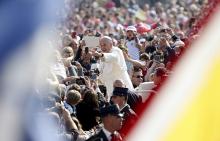
The Vatican is set to host a major conference on climate change this month that will feature leading researchers on global warming and an opening address by U.N. Secretary-General Ban Ki-moon.
The meeting, which the Vatican detailed on its website late on April 14, is another sign of Pope Francis’ “green agenda” and another potential red flag for conservatives who are already alarmed over an expected papal teaching document on the environment that is scheduled for release this summer.
The one-day summit on April 28 will also include participants from major world religions and aims to “elevate the debate on the moral dimensions of protecting the environment in advance of the papal encyclical,” as the papal document is known.
Another goal, says a statement on a Vatican website, is to highlight “the intrinsic connection between respect for the environment and respect for people — especially the poor, the excluded, victims of human trafficking and modern slavery, children, and future generations.”

Pope Francis has repeatedly said he expects his papacy to be a brief one, but Cardinal Walter Kasper is working to ensure that the pontiff’s legacy endures long after this pope leaves the scene.
From the first days of his pontificate two years ago, Francis singled out Kasper for high praise; ever since, the retired German cardinal is frequently known as “the pope’s theologian.”
It’s a moniker the churchman shrugs off with a smile, yet it’s also a label he’s doing nothing to shake, especially in light of Kasper’s most recent book, published last month — a short work that basically describes Francis as a theologian in his own right whose pastoral approach is setting Catholicism on a new course.
The title of the book, from the U.S. Catholic publishing house Paulist Press, says it all: Pope Francis’ Revolution of Tenderness and Love.
But the title also sums up the two-pronged challenge for those, like Kasper, who hope that Francis’ papacy represents lasting change.
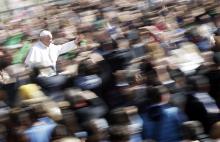
Pope Francis appears more popular than ever among American Catholics, and he hasn’t even visited the U.S. yet, a trip that is planned for September and could well boost his visibility — and appeal — even further.
But will Francis find American Catholics filling the pews? Or just loving the pope from afar? That’s one of the big — and so far unanswered — questions about his remarkable papacy.
Now, one researcher may have found some signs, albeit tentative, of an incipient “Francis effect.”
Mark Gray of Georgetown University’s Center for Applied Research in the Apostolate crunched the Catholic numbers from the 2014 General Social Survey, the go-to resource for sociologists. The GSS began in 1972 and is conducted every two years using face-to-face interviews with a national random sample of adults.
Gray noted that when asked to characterize the strength of their religious affiliation, 34 percent of Catholics said it was “strong,” up from 27 percent in 2012, the year before Francis was elected.
That 7-point rise was a “significant bounce,” Gray said.
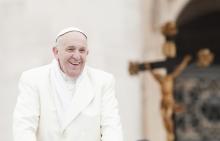
When Pope Francis pays a visit to Naples March 21 he will have lunch with some 90 inmates at a local prison, a contingent that will reportedly include 10 from a section reserved for gay and transgendered prisoners, and those infected with the virus that causes AIDS.
The stopover at the Giuseppe Salvia Detention Center in Poggioreale, near Naples, was originally not scheduled to include lunch, according to a report from Tv2000, an Italian television network operated by the country’s Catholic bishops.
But the pope insisted on the meal, which will be prepared by the prisoners, some of whom will come from two other detention centers. The 90 were chosen by lottery from among 1,900 inmates, according to the Vatican Insider website .
Among the many innovations Francis has made since his election two years ago this month has been a new tone and approach to gay and transgender people.